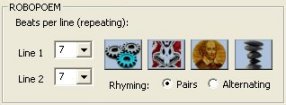|
Robopoem: Automatic Poems and Song
Lyrics |
|
If you
are asked to describe two main factors that distinguishes poetry
from prose, you will probably answer rhythm and rhyme.
If you have some academic background in the subject, you might
elaborate further using terms like "meter", "measure", "metric",
"stresses", "iambic pentameter" etc. What it all boils down to is
that poets, either consciously or unconsciously, arrange the words
of a poem into a rhythmic structure. One way to consciously
create a rhythmic poem is to match the syllable counts in each of
the individual lines that make up a poem. Or, the syllable counts
might be matched in alternating lines, or in even more complex
arrangements. (For example, a Japanese Haiku poem follows a very
strict form: each haiku has 3 lines, the first and last line are 5
syllables each and the middle line is 7.) A syllable can be thought
of as a beat: it is the natural rhythmic unit of a spoken word. In
the case of song lyrics (which are really sung poems), the syllables
usually sync up to the notes in a melody: For example, if you had a
piano player and a singer both performing the same lead melody in a
song, the start point of each syllable being sung would match
the start point of each note being played. (The singer would not
typically start each word of a lyric at each piano note start
point because the result would probably not be rhythmic.)
The
ROBOPOEM functions of Cut 'n' Mix can help in the process of writing
poems and song lyrics by automatically assembling words into lines
of approximately the same number of syllables. The ROBOPOEM process
analyzes the contents of the main (output) text area and calculates
the syllable count for each word. The words are then reordered into
lines that cannot exceed the specified syllable count. Random words
are also thrown into the mix to achieve the desired syllable count
and rhyme the last words in each pair of lines.
To use the
ROBOPOEM functions of Cut 'n' Mix: type, paste or "random fill"
words into the main text area and then click one of the four
ROBOPOEM buttons. Alternately, you can generate a poem with a blank
output area: in this case Cut'n'Mix will get a random selection of
words from it's internal database.
| |
|
Robopoem Control Panel: |

The ROBOPOEM
control panel contains two syllable count selectors (beats per
line) and two rhyming format options. Selecting the Pairs
option with the same beat count for lines one and two will produce a
poem made of "couplets". The Alternating structure might be
used to produce a rhyming structure often found in song lyrics,
where line 1 of a verse may rhyme with line 3, line 2 with 4 etc...
|
Available Poem Generator Types:
* As of version 5.4, the available types are selected
from a drop-down in the ROBOPOEM section, NOT with the buttons
displayed below. |
 |
Regular
Poem This method takes the user text found in the main text area
and attempts to use as much words as possible to assemble a poem
which conforms to the structure defined in the settings panel.
|

|
Shakespeare Mixes user text with random picks
from a custom database of words extracted from the plays of
William Shakespeare. |
 |
Nonsense Mixes user text with nonsense words
in the tradition of Lewis Carroll's Jabberwocky. James
Joyce was another writer who made heavy use of "nonsense" words in
his masterpiece Finnegan's Wake.
|
 |
Haiku
Combines a mixture of user text and random words into the
traditional Japanese Haiku form with 3 lines of 5, 7, then 5
syllables.
|
|
| |

